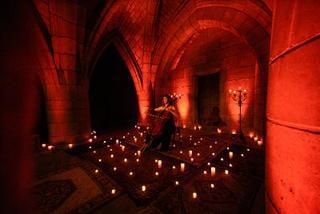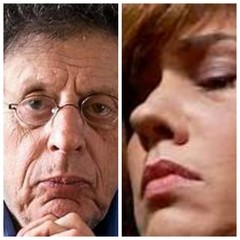|
Back
Crypt Mysteries New York
The Crypt, Church of the Intercession, 155th Street
06/07/2022 - & June 8, 2022
Philip Glass: Songs and Poems I & II
Wendy Sutter (Cellist) 
Ms. Sutter in The Crypt (© Steven Pisano)
“The cello is like a beautiful woman who has not grown older but younger with time, more slender, more supple, more graceful.”
Pablo Casals
One divergence between Johann Sebastian Bach’s Suites for Cello and Philip Glass’s Songs and Poems for cello is that it took around 250 years before Bach’s works reached the public in their entirety. Wendy Sutter, introduced the complete Glass piece in about a decade.
Not only that: the two works turned time upside-down. Bach’s circa 1720 works reached the public thanks to a 20th Century recording machine. The 2010 Glass work were animated a medieval-style candle-lit crypt last night under a Gothic-style church.
The latter was arranged through the musical management company “The Death of Classical”. And where they attempted a unique backdrop for Ms. Sutter, inevitably, nothing could have separated the 21st Century music from the Baroque Master himself.
This was hardly the fault of Sutter or Glass. For the notes of any hour-long cello-work with as many “songs and poems” as Bach had dance movements is bound to come close to imitation. No matter what the reactions for the Poems and Dances, Bach stays in the back–or sometimes the front–of the aural mind.

P. Glass/W. Sutter (© Courtesy of the artists)
Now why did Ms. Sutter play the complete piece last night? The original two sections had been dedicated to Ms. Sutter, but then the composer offered the “second half” to another cellist. Finally last night Wendy Sutter played the complete work on its own.
Whew!
So onto the music. Music which sounds nothing like Philip Glass. Missing are the repetitions, the variations, the subtle changes of harmonies, the mesmeric cycles of motives and motifs. Or perhaps I am wrong. Perhaps the composer’s two groups of 14 song/dances were the very essence, the Philip Glass style pared down to a single instrument. And an instrument lacking even a scintilla of, say, a keyboard variability.
Nor did Mr. Glass compose to show all the tricks and timbres and legerdemain of the 21st Century cello. That could be left to a Berio or Boulez. Philip Glass instead retained the original cello sounds. Yes, double-fingering at times, yes, reaching for the highest notes in the spectrum. But always–always–composing his music for a particular exponent of that music.
At times, admittedly, this turned into a Wittgensteinian language so simple in notes that the meanings were hidden. At time, in the second half, Glass actually exercised his humor, his depths and most rarely, his sense of melody and lyricism.
Those were the points where the so-attentive audience in the Crypt could secretly exhale and say, “Aha! A tune! Let’s hope we can follow the music.” Those were infrequent interludes.
Bach gave us a roadmap in his Suites by labeling each with an 18th Century dance. Thus, the structure, the tempo, the color, the relationships. Philip Glass gave us no hints. We didn’t have time to wonder “What was that line all about?, ”What was he trying to prove?|” “What was the abstract calculus or equation made substantial by the instrument?”
I am absolutely certain that Wendy Sutter would have answers to all these questions. But last night, the answers were given by the fingers, not the words.
And what fingers they were. With such confidence, grace and emotion did she essay these long lines, the jumping phrases, and even the most mathematical quadrants which were given in one hour.
Like certain abstract paintings spellbinding in a gallery–yet which one wouldn’t want to see on a living-room wall–Wendy Sutter offered an experience that defied description, yet which was its own reward.
Later, a friend asked “Where were the poems from Songs and Poems?” A good question. One might as well ask for the music in Blake’s Songs of Innocence and Experience? The fact is that Philip Glass predated Baroque music itself, returning to the Pythagorean concept of music as the manifestation of cosmic rules.
Not that Glass or Sutter ever obeyed those rules. This was a music with its own laws, its own 14 different worlds, and a cellist holding us in the grips of music whose puzzles were their own rewards.
Harry Rolnick
|